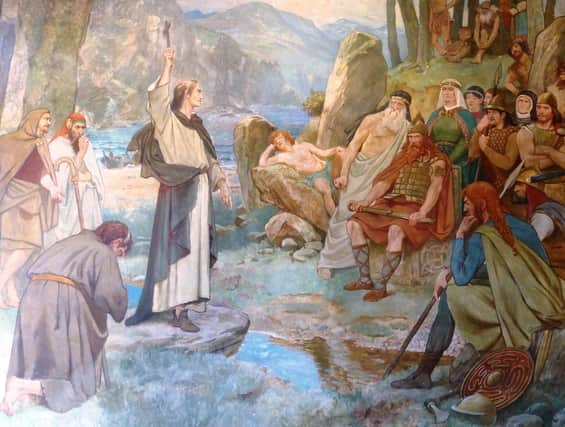Celebrating St Columba, our grumpy but much-lauded saint, who was born 1,500 years ago


There is particular reason for celebrating Columba’s life and legacy this year as it is his 1500 th birthday. Although we can be more precise about the date and place of his death – 9 June 597 on the island of Iona - it seems probable that he was born in 521, possibly in early December in the Loch Garten region of Donegal in north west Ireland.
It is with Iona that Columba will always be associated and where his anniversary is being commemorated this week in conjunction with the re-opening of the Iona Community’s residential and guest accommodation adjacent to the Abbey after major refurbishment following a successful £3.75 million appeal. The new more accessible premises were officially opened by the Princess Royal on Monday.
Advertisement
Hide AdAdvertisement
Hide AdIn fact, Columba lived less than half his life on Iona. His first four decades were spent in Ireland where he followed a monastic vocation and founded several monasteries.
He left Ireland in 563 at the age of 42 for reasons that are not entirely clear, possibly voluntarily as a pilgrim, perhaps
having been banished for some crime or misdemeanour, or maybe simply at the behest of the ruler of the Irish colony of Dal Riata (modern Argyll) to found a church there.
Most historians are now agreed that Columba travelled initially from the north coast of Ireland to the Argyll mainland, perhaps making the short sea crossing to the tip of the Mull of Kintyre, and that he may have spent several years there before being granted land on Iona by the king on which to build his monastery.
The romantic story that he journeyed from island to island until he could no longer see his beloved Ireland only emerged in the seventeenth century.
Columba is unusual among Celtic saints in having been written about soon after his death – most others had to wait several years before their lives and deeds were recorded. As a result, he is the figure from the so-called Golden Age of Celtic Christianity about whom we know most.
He emerges from these early sources as a complex and even contradictory character, as suggested by his two Gaelic nicknames, Crimthann (the fox) and Colmcille (the dove of the church), the Latin version of which provides his commonly used name, Columba.
He had a hasty temper and an autocratic manner and was known in Irish tradition as the bad-tempered saint, but he was also a man of prayer and had remarkable pastoral gifts which he exercised with the many people who came to visit him on Iona seeking spiritual counselling.
Advertisement
Hide AdAdvertisement
Hide AdPortrayed as priest, poet, mystic and miracle worker, he clearly had a charisma and played a key role in championing and legitimizing the claims of the Gaels of Dal Riata who would later be the dominant element in the emerging new kingdom of Scotland giving it its name which literally means the land of the Irish.
After death he was taken up as the protector of the Scots – his relics were paraded in front of the Scottish army at the Battle of Bannockburn. Although he was ultimately trumped as the nation’s patron saint by Andrew, thanks to some sharp public relations work by the Picts of North East Fife and the support of the ecclesiastical establishment, he remained a much
more popular figure, celebrated in stories, poems and numerous medieval church dedications.
Columba has been posthumously enlisted in many causes, including ecumenism, Gaelic culture and Irish-Scottish links. As well as being enlisted and appropriated by many Christian denominations, he has also appealed to pagans, theosophists and humanists.
New Agers regard him as a Druidic seer while Evangelical Christians identify with his decidedly conservative theology.
Among the few contemporary causes which he cannot be enlisted for is feminism – he showed distinctly chauvinistic tendencies in the way he ran his all-male monasteries.
In many ways he achieved a modern reincarnation in the figure of George MacLeod, the Church of Scotland minister who founded the modern Iona Community in the 1930s. The two men had much in common – an aristocratic background and all-male upbringing making for a somewhat autocratic style of leadership combined with a deep spirituality, a strong mystical bent, a belief in the values of community and communal life and a passionate attachment to political activity in the
areas of justice and peace.
Were he to make a 1500 th birthday visit back to his island monastery today – and given the numerous miraculous and mysterious out of the body experiences associated with him, that is perhaps not quite as far-fetched as it sounds – Columba would find much to applaud and affirm in the life and witness of the modern Iona Community.
Advertisement
Hide AdAdvertisement
Hide AdPerhaps his austere and rigorously ascetic attitude to monastic life might be offended by the more comfortable facilities which the recent refurbishment has provided for guests, although it has been particularly designed to make them
more accessible to those with disabilities.
He might also be somewhat surprised to find women occupying the roles of both Abbey warden and Community leader. So, indeed, might George MacLeod, although in his words ‘if you think that a coincidence, I wish you a very dull life’.
-Ian Bradley is Emeritus Professor of Cultural and Spiritual History at the University of St Andrews and
the author of Columba: Politician, Penitent and Pilgrim, published by Wild Goose Publications